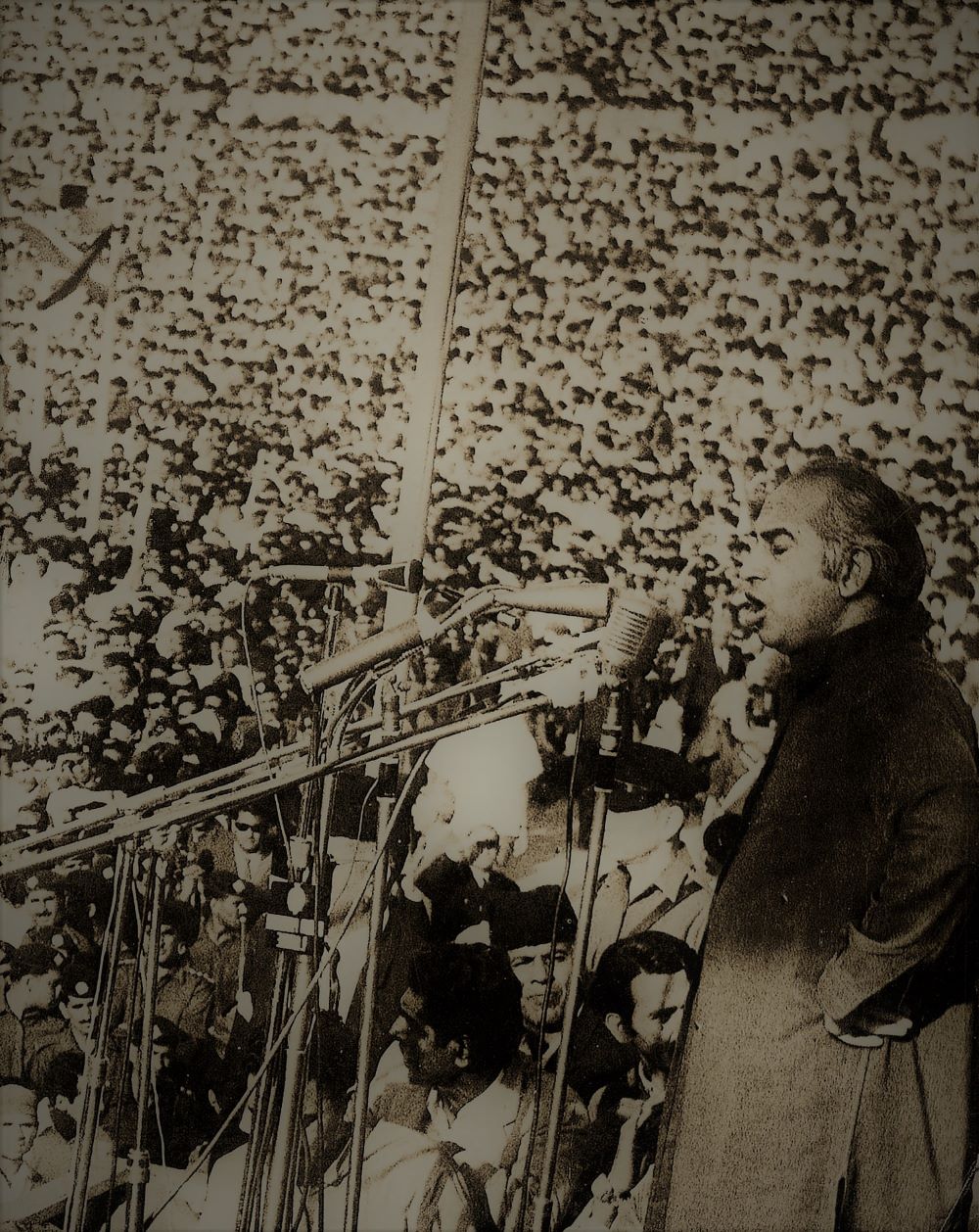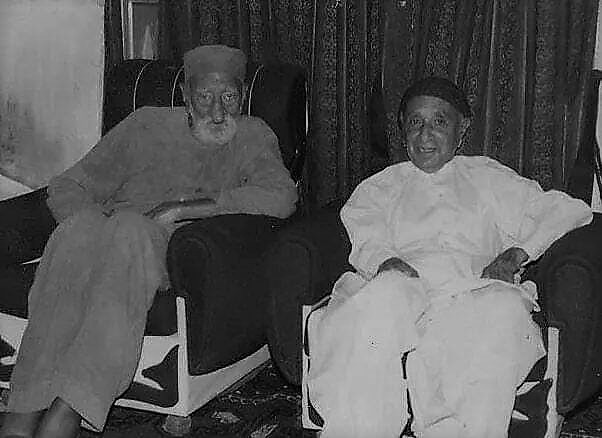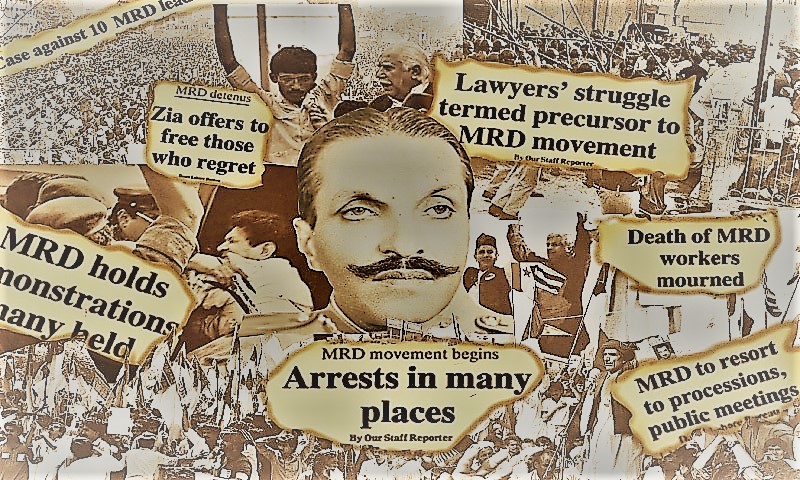There is no doubt that Bhutto was a great leader, and he was Sindhi. He popularized the role of common men in politics – Dr. Hamida Khuhro
[Translator’s note: This is a translation of renowned historian Dr. Hamida Khuhro’s comprehensive interview, originally published in the Sindhi magazine Nao Niapo, Karachi in May, 1986. The interview panel consisted of Advocate Masood Noorani (MN), Journalist Nasir Aijaz (NA) and Faqir Muhammad Lashari (FM), with Mansoor Qadir Junjo’s assistance to the interviewers. Masood Noorani also contributed observation notes from his initial meeting with Dr. Khuhro, which were used as a preamble to the interview. The interview was later included in an anthology that contained interviews of Dr. Khuhro, published in various Sindhi newspapers and magazines.
In 2021, Dr. Hamida Khuhro Foundation, Sindh (Karachi-Hyderabad) published Nao Napo magazine’s interview as a separate booklet with a title of ‘Tareekh Ji Amhon Samhon’ (Face-to-Face with History). The booklet includes a preface by Mansoor Qadir Junejo. Zaffar Junejo]
I haven’t seen any economic expert who can analyze and guide us about our current position – Dr. Hamida Khuhro
FM: Continuing with the previous question, I would like to mention that Lenin argued in favor of socialism as a non-capitalist mode of development. However, it is also true that such success couldn’t have happened without support from foreign countries. We can cite examples of various countries like Mongolia, China, Vietnam, Angola, and Mozambique, all of which received support from Russia. Do you also share a similar perspective?
HK: When there was a revolution in China, it appeared to be a good example for us. They mobilized the peasants, but nowadays China itself seems to have distanced itself from its earlier revolutionary ideas, in a way rejecting them. I mean, they have become considerably detached. Nevertheless, we have these examples before us, and we are well aware of their weaknesses. We need to nurture our own intellectuals. Another example is Bangladesh, although their economic situation is not ideal, it is not as bad as it is often portrayed. However, their economic experts pointed out that how West Pakistan exploited them. But in our case, I haven’t seen any economic expert who can analyze and guide us about our current position. I am not an economic expert myself, but I firmly believe that there must be some economic experts who are capable of guiding us about the present situation and preparing a blueprint, a roadmap for us. Honestly, all parties, whether Jeay Sindh or PPP, need to declare their blueprints or roadmaps and say, “This is the present situation, and this is our mission, where we want to lead the people. “ (She looks at MN) Earlier, you asked me, “What would be my course of action?” In response to that question, my first priority would be to prepare myself, to do my homework and understand where we currently stand and how to change that status quo. I genuinely believe that without such analysis, declaring a party is a joke played on the people.

Zulfiqar Ali Bhutto addressing a crowd
FM: Based on that argument, Jeay Sindh has been criticized that it has slogans but lacks a concrete plan or seriousness.
HK: None of the parties have made such preparations! So far, I haven’t come across any party document or book that outlines their planning or next steps. Therefore, it seems that none of the political parties are working seriously. However, Jeay Sindh has political literature, but it lacks concrete analysis.
MN: There are a few parties that are working on a scientific basis. In this regard, we can mention the work of Awami Tahreek, and now we can also add the name of Watandost Party. I have read their pamphlets, and to some extent, their political work is research-based.
HK: I have seen their pamphlets, but I haven’t read their books that provide us with scientific analysis.

Khan Abdul Ghaffar Khan and GM Syed –
We Sindhis are weak. We need experts who work on a scientific basis.
FM: There are theses in Sindh.
HK: (She smiles) Anyone can write a superficial thesis, but the question is about having accurate figures and their contextual analysis. Claiming to have theses is a convenient statement. Even I could issue a statement saying, “We have analysis and we are fully prepared.” On the other hand, it is true that none of the political parties, including Jeay Sindh or others, have systematic figures and their interpretation. (She takes a deep sigh) We Sindhis are weak in that area. We need experts who work on a scientific basis.
MN: When you lay out your plans, where does the PPP fit in? Will it be supportive or opposing?
HK: PPP’s struggle is for power. It is a political party at the national level in Pakistan. It may plan to overthrow the current government or align with other generals for a coup against General Zia, but I don’t know what compromises they make or what their internal stories are! I hope they take care of Sindh’s interests, but it is not apparent.
Bhutto broke the politics of drawing rooms and traditional interest groups
NA: Earlier, you mentioned that “Sindhi people have not awareness, except its students’ community,” and now you stated, “Peoples’ Party is working for power.” Now a question arises that whenever a political party or Jeay Sindh calls for Sindh’s rights, it is not overwhelmingly received, but when the PPP makes the call, it is welcomed by the people. What are the reasons? Why do people suddenly become aware and respond PPP’s call?
HK: There are definitely some reasons. One of the reasons was Bhutto’s charismatic personality. I still remember his first election. He was the first politician who met with common people – on the streets, in fields – everywhere, and presented his political program. He broke the politics of drawing rooms and traditional interest groups who would meet among themselves and decide the people’s future. Before that, the Muslim League also experienced such politics involving common men, particularly during its Masjid Manzilgah Satyagraha. But that was a story of earlier days, and roughly 20 to 30 years had passed. Bhutto reintroduced people’s politics and introduced new slogans – all these slogans were well-received. I remember that common workers in Lahore in those days used to say, “X or Y bungalow of Gulberg would be taken by him.” This motivation was rooted in Bhutto’s claim or slogan that “everyone would have their own house.” Therefore, he received huge support in Punjab and won seats in Sindh – he was supported by the masses as well as the Jagirdars. Bhutto Sahib adopted the model of Sukarno and other leaders of the Third World and gained support. However, the military interrupted his period in power. The hanging of Zulfiqar Ali Bhutto is also one reason for the present popularity of the PPP. Now, the Bhutto family is a family of martyrs.
Bhutto popularized the role of common men in politics – for the first time, the Sindhi cap was seen in Karachi, and the Hojamlo song was heard.
NA: Sindhi people are nationalists; it is part of their life. You also mentioned in one interview that “ninety percent of people are not willing to utter Pakistan’s slogan.” In that situation, why do people follow PPP and Benazir Bhutto?
HK: During Bhutto’s time, many Sindhis got government jobs. However, whether it was a matter of chance, situation, or a plan – it is another question. Regardless, there is no doubt that he was a great leader, and he was Sindhi. He popularized the role of common men in politics – for the first time, the Sindhi cap was seen in Karachi, and the Hojamlo song was heard. In that context, Sindhis saw his hanging as an attack on Sindhis and believed that if he had been Punjabi, he would never have been hanged. Punjabis used him to secure the liberation of their army from India and then discarded him. Bhutto’s hanging was a practical proof of G.M. Syed’s statement. As a result, nationalism gained popularity. However, Sindhis also realized that the army was now governing them. In reaction, people welcomed Benazir Bhutto, and the leading motive was the spirit of Sindhyat. However, people from Punjab approached her to save Pakistan, as there were separatist slogans in Sindh, and Khan Abdul Ghaffar Khan was welcomed in Sindh, and the Front was being formed. This was the primary reason why Punjabis reached out to Benazir – to save Pakistan.

MRD Movement – a poster (Courtesy: Dawn)
Sindhis saw Bhutto’s hanging as an attack on Sindhis and believed that if he had been Punjabi, he would never have been hanged.
NA: Your personality has become controversial for quite some time now. Let me give some examples: You supported elections, showed interest in the national assembly’s election, met with military personnel, and claimed as a spokesperson for G.M. Syed.
FM: Your family is also in power.
HK: (She laughs) That is another story – someone is in the government, another is involved in the movement, and someone else is elsewhere.
NA: Meanwhile, it was also learned that you were announcing your own party but postponed it. What were the reasons?
HK: Let us start with why I participated in the elections.
NA: Yes.
HK: It was a well-thought-out decision on my part. I did it due to certain political weaknesses in Sindh. For example, people participated in the MRD Movement, and they were killed. But the people who mobilized them betrayed them, offered apologies, and came out of prisons. (Continues)
Published under International Cooperation with"Sind Courier"
Comments